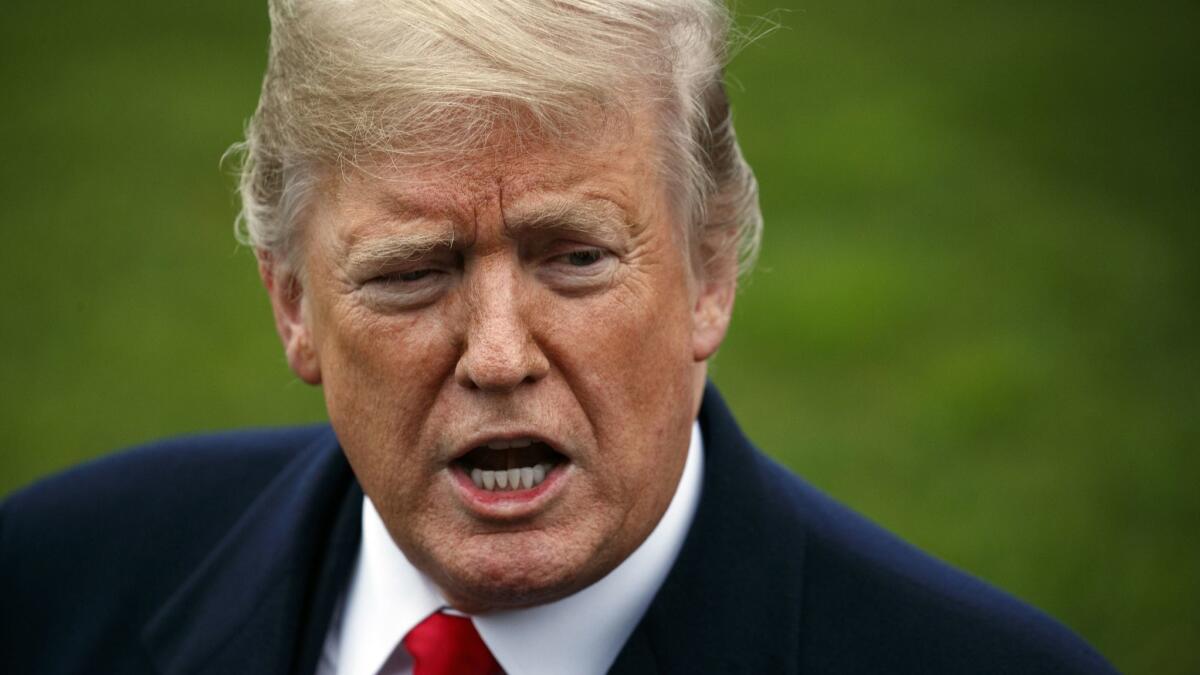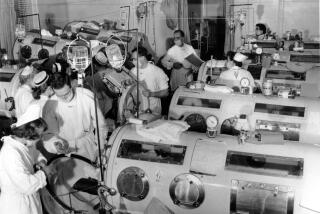Op-Ed: Trump hates science. Sad!

Like many girls growing up in the late 1960s, I was intimidated by math and science throughout my school years and into college, where I avoided lab units in biology and chemistry whenever possible. But something happened that made me a late-blooming science fan. At age 57, cancer hit.
As I’ve written about before in the Los Angeles Times, I underwent the standard healthcare regimen for my condition (surgery, chemo and radiation), but the cancer metastasized anyway and I was given a “yearish” to live. Then, in July of 2015, I became a human science project, a participant in clinical trials at UC San Francisco, one of the top cancer research centers in the world. Today, I’m well past my overdue date, as are many of the other Stage 4 cancer patients, thanks to breakthroughs in immunotherapy and cutting-edge treatments that arrived courtesy of tenacious researchers, the lives of many mice and the evidence-based, peer-reviewed work of medical science.
All this is to explain my ever-increasing alarm at the level of scorn the findings of science now attract in the realm of public policy. President Trump and members of his revolving-door Cabinet have shown no let-up since 2017 in their disdain for scientific truths, mischaracterizing them as opinions that are somehow partisan in nature and expendable.
It’s science alone that offers us any real hope.
“The State of Science in the Trump Era,” just published by the Union of Concerned Scientists, says it all. “The administration is radically weakening processes that guide the use of science in policymaking,” it states. The report goes on to detail how U.S. scientists are being excluded from decision-making, removed from advisory committees at agencies such as OSHA, the FDA and the EPA, hampered in the collection of data and, generally, treated with hostility by leaders of the government. In the budgets Trump has proposed, he has asked for deep cuts in science, technology and health programs and research, especially at the National Institutes of Health and the Environmental Protection Agency; science fans in Congress, however, have prevailed.
Climate change offers the best (worst) example of Trump’s dismissive approach to empirical data and scientific expertise. Trump considers the threat of human-made global warming as something one can believe in or not, like the Easter Bunny. An alarming series of scientific reports on the climate crisis were published in 2018, including the two-volume “Fourth National Climate Assessment” in November, in which hundreds of scientists from 13 U.S. agencies predicted across-the-board devastation in the near future caused by climate change. A month earlier, the United Nations Intergovernmental Panel on Climate Change painted an equally fearsome global picture of the consequences of global warming. Its assessment is known as the “Doomsday” report — a handle that speaks for itself.
Presented with these findings, Trump’s response was: “I don’t believe it.”
When he called for a U.S. withdrawal from the Paris Climate Agreement in 2017, he was just getting started. On Feb. 20, his administration doubled-down on this obstinacy by announcing the convening of a White House “select” panel on the climate that clearly will seek to undermine the overwhelming scientific evidence that the planet and its residents are in serious trouble. Princeton physicist William Happer, a climate-change denier, will spearhead the team.
The late, great neurologist Oliver Sacks sums up our situation in a recent essay published posthumously in the New Yorker: “I revere good writing and art and music, but it seems to me that only science, aided by human decency, common sense, farsightedness, and concern for the unfortunate and the poor, offers the world any hope.”
Enter the Fray: First takes on the news of the minute »
As a living, breathing science experiment myself these past years, I consider myself unthinkably lucky to have a front-row seat for this ultimate reality series. As of December, thanks to immunotherapy and gene-based treatments, I’m officially considered to be in remission and “cancer free” though I paradoxically carry a prognosis of metastatic cancer. My testimony, my life can serve as a reminder of the contrast between the evidence-based, problem-solving approach that may one day change outcomes for millions more cancer patients, and the anti-science, hubris-laden posture evident in the halls of power in America.
In October a pair of gifted scientists — James Allison and Tasuku Honjo — won the Nobel Prize for their work in immunotherapy. The day after the announcement I hunted down email addresses and sent them both congratulations with the subject head “Thank You For Saving My Life.” I got lovely messages from both of them. I was elated when Allison responded within hours: “Dear Melinda, thank you. Your message is worth more than any prize.”
Brilliant and modest. Persevering. Dedicated to using reason, testable data and the scientific method to systematically tackle seemingly impossible problems. Imagine what it would be like, at this moment in history, to see men and women with qualities like these empowered by the White House instead of ignored and dishonored. As Sacks reminds us, it’s science alone that offers us any real hope.
Melinda Welsh lives in Sacramento.
Follow the Opinion section on Twitter @latimesopinionand Facebook
More to Read
A cure for the common opinion
Get thought-provoking perspectives with our weekly newsletter.
You may occasionally receive promotional content from the Los Angeles Times.






